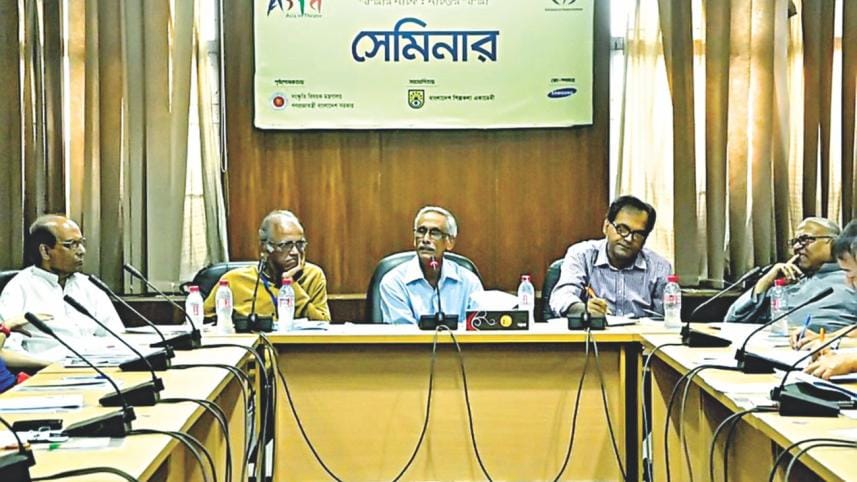ITI Bangladesh Centre

International Theatre Institute (ITI) Bangladesh Centre completed its thirty-six years in March 2018. Throughout the long 36 years, it has proved to the world of performing arts that sans so-called professionalism, theater workers of this country have been able to create an ambiance of professional skill in theatre. In fact, to be an affiliate with a world organization like ITI, professional theatre practice is one of the basic conditions. But Bangladesh group theatre practice, even being amateurish, possesses so much of rectitude and missionary zeal that ITI Worldwide has been positively convinced to recognize its professionalism and subsequently grab the membership.
Tobias Biancone, the present Director General, ITI, once wrote in his message titled Admiration, “Let me look at the arts in Bangladesh: . . . . When visiting Bangladesh . . . I was always astonished about the people's love for culture that I could encounter in a gallery, during a concert, at New Year in the Ramna Park early in the morning when I heard people chanting poems and singing; or watching a dance performance in a closed venue, or looking at street theatre near a lake or even when a big crowd was marching during the Mother Language Day. This is unique in the world – and I experienced it in present time.”
So, that's Bangladesh where language and culture are deeply rooted and where people's cultural amateurism is inherently their professionalism. Same attributes mirror in the ITI Bangladesh Centre. The Centre has been holding different theatrical events, festivals and workshops liaising with the ITI Worldwide and other centers globally.
Bangladesh regularly attends ITI World Congress, and in the last 35th Congress held in Segovia, Spain in 2017, Bangladesh had the highest participation so far. For easy and smooth functioning of ITI Worldwide, five main bodies have been formed, and they are: Artistic, Educational, Humanitarian, Research, Documentation & Promotion, and Collaboration Project. There are a total of fifteen sub-committees under those divisions and Bangladesh has always represented significantly as Board Members of those committees. Presently the following persons are members of the committees mentioned against their names: Irine Parvin Lopa, International Monodrama Forum; Abdus Selim and Sadhana Ahmed: International Playwrights' Forum; Sayik Siddiquee: Network of Emerging Arts Professional; Abdus Selim: International Stage Directors Network: Shafi Ahmed & Israfil Shaheen: Forum Theatre Training & Education; Abdus Selim: Action Committee for Artist Rights; Nasiruddin Yousuff Bachchu: Network for Heritage, Indigenous Culture & Migration; and, Babul Biswas (Committee Secretary) & Mofidul Hoque (Member), ITI Publications Committee. Ramendu Majumdar's election to ITI Worldwide Presidency for two consecutive terms is an added success story.
As stated by Nasiruddin Yousuff Bachchu, present President, ITI Bangladesh, from the 1st Dhaka International Theatre Fest 2012 the Centre has been trying to go by the event-calendar. One other routine event of the Centre happens to be the Monodrama Festival. So far two Monodrama Festivals were held with tremendous success – one in 2011 and the other in 2016. But it is really strenuous enough for an organization run by mere voluntary efforts to stick to the calendar.
The person who has been responsible for executing the Centre's all functions pragmatically for last five years is Debaprasad Debnath, General Secretary, ITI Bangladesh. His expertise and in-built skill for running an organization has put the Centre at an admirable height. A few days back he briefed me about the two-day celebration of 70 years of ITI by the Centre in October 2018. Among a wide range of events it contains songs of Bangla plays, folk drama festival, seminar, documentation of 70 years of ITI Worldwide and 36 years of ITI Bangladesh, documentaries, and many more. Another important member of the Centre is Prof. Shafi Ahmed who almost singlehandedly and tirelessly has taken the challenges of all publication works of the Centre. On the other hand, Ramendu Majumdar and Mofidul Hoque have been co-editing the prestigious journal of the ITI Worldwide The World of Theatre for over twenty years now. The journal is published from Bangladesh.
One great thing has happened because of ITI's activities in Bangladesh. Babul Biswas, a veteran theatre activist, has been enthused to develop an archive by the name Bangladesh Theatre Archive by means of his individual effort. The present write up is deeply indebted to the archive for some relevant information provided. No doubt ITI Bangladesh Centre has been playing a crucial role in the realms of theatre both at home and abroad for long 36 years. Vive ITI Bangladesh Centre!
The writer is a theatre activist, playwright and theatre critic. He is also a Bangla Academy awardee for translation.



 For all latest news, follow The Daily Star's Google News channel.
For all latest news, follow The Daily Star's Google News channel.
Comments